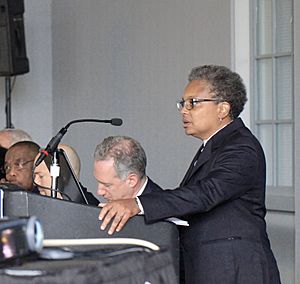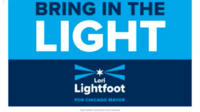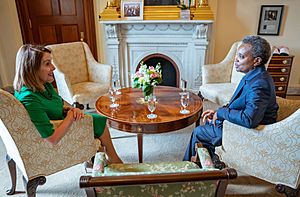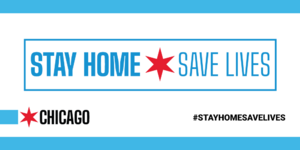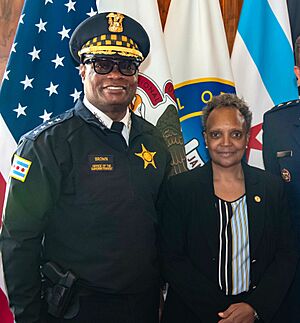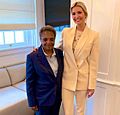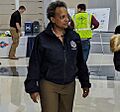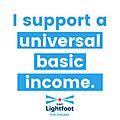Lori Lightfoot facts for kids
Quick facts for kids
Lori Lightfoot
|
|
|---|---|
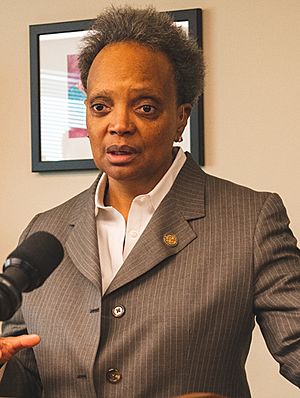
Lightfoot in 2023
|
|
| 56th Mayor of Chicago | |
| In office May 20, 2019 – May 15, 2023 |
|
| Deputy | Tom Tunney |
| Preceded by | Rahm Emanuel |
| Succeeded by | Brandon Johnson |
| President of the Chicago Police Board | |
| In office July 29, 2015 – May 7, 2018 |
|
| Appointed by | Rahm Emanuel |
| Preceded by | Demetrius Carney |
| Succeeded by | Ghian Foreman |
| Personal details | |
| Born |
Lori Elaine Lightfoot
August 4, 1962 Massillon, Ohio, U.S. |
| Political party | Democratic |
| Spouse |
Amy Eshleman
(m. 2014) |
| Children | 1 |
| Education | University of Michigan (BA) University of Chicago (JD) |
| Signature | |
Lori Elaine Lightfoot (born August 4, 1962) is an American politician and lawyer. She served as the 56th mayor of Chicago from 2019 to 2023. As a member of the Democratic Party, she made history in Chicago. She was the first Black woman and the first openly LGBTQ person to be elected mayor of the city.
Before becoming mayor, Lightfoot worked as a lawyer and held several government jobs in Chicago. She was the president of the Chicago Police Board and led the Chicago Police Accountability Task Force. In these roles, she helped review cases of police misconduct.
Lightfoot won the 2019 election for mayor by a large margin. As mayor, she worked to raise the city's minimum wage and build more affordable housing. Her time in office also had challenges, including rising crime rates and the COVID-19 pandemic. When she ran for reelection in 2023, she lost, becoming the first Chicago mayor in 40 years to not win a second term.
Contents
Early Life and Schooling
Lori Lightfoot was born in Massillon, Ohio. She was the youngest of four children. Her mother, Ann, worked in healthcare and was on the local school board. Her father, Elijah, worked in a factory.
Lightfoot went to Washington High School in Massillon. She was very active in school. She played the trumpet in the band, sang in the choir, and played basketball, volleyball, and softball. She was also elected class president three times.
She earned a degree in political science from the University of Michigan in 1984. To pay for her education, she worked many jobs, including as a cook for the school's football team. After college, she worked for members of Congress before deciding to go to law school. She received a full scholarship to the University of Chicago Law School and graduated in 1989.
Career Before Becoming Mayor
Working as a Lawyer
After law school, Lightfoot worked as an attorney for the U.S. government in Illinois. She helped prosecute people accused of federal crimes. She also worked for the law firm Mayer Brown.
In 2002, she was chosen to lead the Chicago Police Department's Office of Professional Standards. This office investigated police misconduct. Lightfoot often recommended serious discipline for officers, but her suggestions were not always followed.
For a short time, she also worked for the city's procurement department, where she investigated corruption. She later returned to her job at the Mayer Brown law firm.
Chicago Police Board and Task Force
In 2015, Mayor Rahm Emanuel appointed Lightfoot as president of the Chicago Police Board. This board reviews serious police discipline cases. Later, she was also made the head of the Police Accountability Task Force.
The task force wrote a report that was critical of the Chicago Police Department. It pointed out problems and called for reforms. Lightfoot resigned from the Police Board in May 2018, shortly before she announced she would run for mayor.
2019 Campaign for Mayor
On May 10, 2018, Lori Lightfoot announced she was running for mayor of Chicago. It was her first time running for public office. She was also the first openly lesbian candidate in the city's history.
At first, not many people thought she would win. There were 14 candidates in the race. But as the election got closer, her support grew. She finished first in the first round of voting in February 2019.
Because no one got more than 50% of the vote, she had to compete in a final runoff election against Toni Preckwinkle. Lightfoot won the runoff election on April 2, 2019, with over 73% of the vote. She won in all 50 of the city's wards, which are like neighborhoods.
Mayor of Chicago (2019–2023)
Lightfoot's time as mayor included both successes and challenges. She was praised for trying to improve the city, but also faced criticism for how she handled some issues.
First Actions as Mayor
Lightfoot was sworn in as mayor on May 20, 2019. One of her first actions was to sign an order to limit the power of individual city council members, known as aldermen. She wanted to make city government more fair and open.
She also called for ethics reforms in the city council and urged Alderman Edward M. Burke, who was facing federal charges, to resign.
Handling the COVID-19 Pandemic
The COVID-19 pandemic was a major challenge during Lightfoot's term. She took many steps to slow the spread of the virus in Chicago. This included postponing the city's St. Patrick's Day parade and putting limits on businesses.
Her administration also closed parks and beaches to stop people from gathering in large groups. She started a campaign called "Stay Home, Save Lives" to encourage people to follow the state's stay-at-home order. To help first responders, she arranged for hotel rooms where they could stay to avoid spreading the virus to their families.
Public Safety and Police
Reducing gun violence was a major focus for Lightfoot. She started a program called Our City. Our Safety to increase police patrols and provide free programs for young people.
In 2019, she fired Police Superintendent Eddie T. Johnson and later appointed David Brown as the new superintendent.
During the Black Lives Matter protests in 2020, Lightfoot said that police unions were often an obstacle to reform. She asked the public to report any police misconduct they saw.
Other Accomplishments
- Minimum Wage: The Chicago City Council approved her plan to raise the city's minimum wage to $15 an hour by 2021.
- Affordable Housing: She created a task force to find ways to make housing in Chicago more affordable for everyone.
- Chicago Casino: Lightfoot worked to bring a casino to Chicago. In 2022, she announced that Bally's Corporation would build a casino and resort in the city.
2023 Reelection Campaign
Lightfoot ran for a second term as mayor in 2023. She faced eight other candidates in the election. The race was very close.
On February 28, 2023, Lightfoot finished in third place. This meant she did not qualify for the final runoff election. Brandon Johnson went on to win the election and became the next mayor.
Life After Being Mayor
After her term as mayor ended, Lightfoot began teaching at Harvard University. She teaches a course on health policy and leadership at the T.H. Chan School of Public Health.
In national politics, Lightfoot supported Joe Biden for president in 2020. She appeared in a video at the 2020 Democratic National Convention.
Personal Life
Lightfoot lives in the Logan Square neighborhood of Chicago. In 2014, she married Amy Eshleman. They have an adopted daughter.
She is a big sports fan and has season tickets for the Chicago Bears, Chicago White Sox, and the Chicago Sky WNBA team.
Images for kids
See also
 In Spanish: Lori Lightfoot para niños
In Spanish: Lori Lightfoot para niños
- List of mayors of the 50 largest cities in the United States
- List of the first LGBT holders of political offices in the United States


